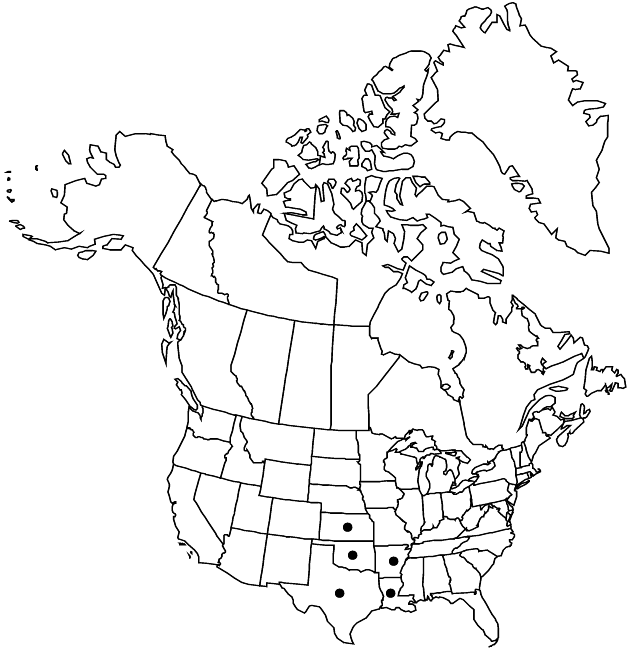Difference between revisions of "Packera tampicana"
Kew Bull. 47: 101. 1992.
FNA>Volume Importer |
FNA>Volume Importer |
||
| Line 15: | Line 15: | ||
|name=Senecio greggii | |name=Senecio greggii | ||
|authority=Rydberg | |authority=Rydberg | ||
| − | }}{{Treatment/ID/Synonym | + | }} {{Treatment/ID/Synonym |
|name=Senecio imparipinnatus | |name=Senecio imparipinnatus | ||
|authority=Klatt | |authority=Klatt | ||
| Line 33: | Line 33: | ||
|elevation=0–1000 m | |elevation=0–1000 m | ||
|distribution=Ark.;Kans.;La.;Okla.;Tex.;Mexico. | |distribution=Ark.;Kans.;La.;Okla.;Tex.;Mexico. | ||
| − | |discussion=<p>Packera tampicana is fairly widespread along the Gulf Coastal Plain and north and in Mexico. Morphologically, P. tampicana most closely resembles P. glabella; the former grows in very wet, sandy or clay soils and open sunlight, the latter grows in drier habitats, usually in partial shade.</p> | + | |discussion=<p><i>Packera tampicana</i> is fairly widespread along the Gulf Coastal Plain and north and in Mexico. Morphologically, <i>P. tampicana</i> most closely resembles <i>P. glabella</i>; the former grows in very wet, sandy or clay soils and open sunlight, the latter grows in drier habitats, usually in partial shade.</p> |
|tables= | |tables= | ||
|references= | |references= | ||
| Line 57: | Line 57: | ||
|publication year=1992 | |publication year=1992 | ||
|special status= | |special status= | ||
| − | |source xml=https://jpend@bitbucket.org/aafc-mbb/fna-data-curation.git/src/ | + | |source xml=https://jpend@bitbucket.org/aafc-mbb/fna-data-curation.git/src/8f726806613d60c220dc4493de13607dd3150896/coarse_grained_fna_xml/V19-20-21/V20_1347.xml |
|tribe=Asteraceae tribe Senecioneae | |tribe=Asteraceae tribe Senecioneae | ||
|genus=Packera | |genus=Packera | ||
Revision as of 15:19, 18 September 2019
Annuals, 20–50+ cm; taprooted (caudices ascending to erect). Stems 1 or 2–6+, clustered (bases cyanic), glabrous or leaf axils sparsely tomentose. Basal leaves (and proximal cauline) petiolate; blades oblanceolate to spatulate (usually pinnately lobed, lateral lobes 1–6+ pairs, their bases petioluliform, terminal lobes usually larger than laterals, often reniform to ± orbiculate, midribs sometimes ± winged and/or toothed between the primary lobes), 40–120+ × 10–30+ mm, bases ± cuneate, ultimate margins subentire or irregularly crenate, dentate, or lobed. Cauline leaves gradually reduced (± petiolate or sessile, clasping; often auriculate, pinnately dissected to pinnately lobed). Heads 4–25+ in corymbiform arrays. Peduncles bracteate, glabrous. Calyculi inconspicuous or 0. Phyllaries 13 or 21, green (tips sometimes reddish), 3–7 mm, glabrous. Ray florets 8 or 13; corolla laminae 3–7 mm. Disc florets 30–45(–100+); corolla tubes 1.5–2.5 mm, limbs (1.5–)2.5–3.5 mm. Cypselae 1–1.5 mm, hirtellous on ribs; pappi 3–5 mm. 2n = 46.
Phenology: Flowering Feb–Jun.
Habitat: Disturbed, wet, sandy or clay sites, roadsides, stream banks, waste areas
Elevation: 0–1000 m
Distribution

Ark., Kans., La., Okla., Tex., Mexico.
Discussion
Packera tampicana is fairly widespread along the Gulf Coastal Plain and north and in Mexico. Morphologically, P. tampicana most closely resembles P. glabella; the former grows in very wet, sandy or clay soils and open sunlight, the latter grows in drier habitats, usually in partial shade.
Selected References
None.